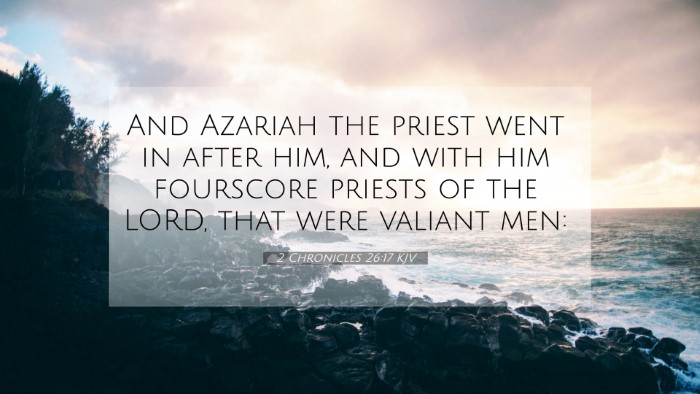Understanding 2 Chronicles 26:17
In 2 Chronicles 26:17, we encounter a pivotal moment during the reign of King Uzziah:
"But Uzziah went in and the priests after him were all set out of the sacred place..."
This verse highlights the dynamics between leadership, authority, and divine order as Uzziah attempts to usurp the role of the priesthood. The implications are significant in understanding the theme of appropriate roles within spiritual governance.
Verse Context
This chapter records the remarkable success and eventual downfall of Uzziah, illustrating the importance of humility before God. Beginning as a king who sought to honor God, Uzziah’s actions in the sanctuary speak volumes about the necessity of respecting divinely established authority and worship protocols.
Commentary Insights
-
Matthew Henry:
Henry emphasizes the danger of pride leading to disobedience. Uzziah, in his arrogance, believed he could cross the boundaries set by the Lord. Henry notes interpretations of God's law regarding worship and the sanctity of the priestly role, reminding readers of the importance of adhering to divine instruction.
-
Albert Barnes:
Barnes points out the historical significance of Uzziah’s actions, interpreting them as a form of overreach that led to his downfall. His commentary illustrates the spiritual consequences of stepping outside divinely appointed roles, showcasing how improper conduct results in divine judgment.
-
Adam Clarke:
Clarke focuses on the events leading up to this act, noting Uzziah's earlier success as king and how that led to a heart filled with pride. Clarke warns about the subtle progression into sin, which often begins with success and can culminate in severe consequences if not kept in check through humility.
Bible Verse Cross-References
To deepen understanding of 2 Chronicles 26:17, consider the following cross-references that provide additional context and insight:
- Leviticus 10:1-2: The consequences of improper worship.
- 1 Chronicles 24:3: The role of the priesthood established by God.
- Numbers 16:1-3: The rebellion against appointed leaders.
- 2 Chronicles 26:16: The transition from humility to pride in Uzziah's life.
- Hebrews 5:4: Establishing the divine right to call priests.
- 1 Samuel 13:8-14: Saul’s unfaithfulness and consequence of overstepping authority.
- Proverbs 16:18: A prideful heart before destruction.
- Isaiah 6:1-5: The holiness of the Lord and proper worship.
- 2 Samuel 6:6-7: The danger of mishandling sacred duties.
- James 4:6: The principle that God opposes the proud but gives grace to the humble.
Thematic Connections
The incident surrounding Uzziah draws parallels with various biblical themes related to leadership, authority, and the importance of humility in the presence of God. The following thematic connections are noteworthy:
-
Humility vs. Pride:
The contrast between Uzziah’s initial humility as a young king seeking God and his later pride provides a cautionary tale relevant in both Old and New Testament contexts.
-
Spiritual Authority:
The acknowledgment of divinely appointed roles serves as a reminder about the flow of spiritual authority and the structure God established for worship and governance.
-
Divine Judgment:
The consequences of Uzziah's actions reflect a broader biblical principle on divine judgment regarding proper worship practices throughout scripture.
Application for Today's Readers
Understanding the implications of 2 Chronicles 26:17 offers contemporary readers important lessons regarding the need for humility, respect for spiritual authority, and recognition of divine order in personal and communal worship practices.
Conclusion
2 Chronicles 26:17 and its cross-references underscore the essence of obeying God's commandments and holding to the structures he has established for worship. As Uzziah's story illustrates, pride can lead to downfall; therefore, maintaining a posture of reverence and adherence to God's prescribed order is crucial in our spiritual walk.





